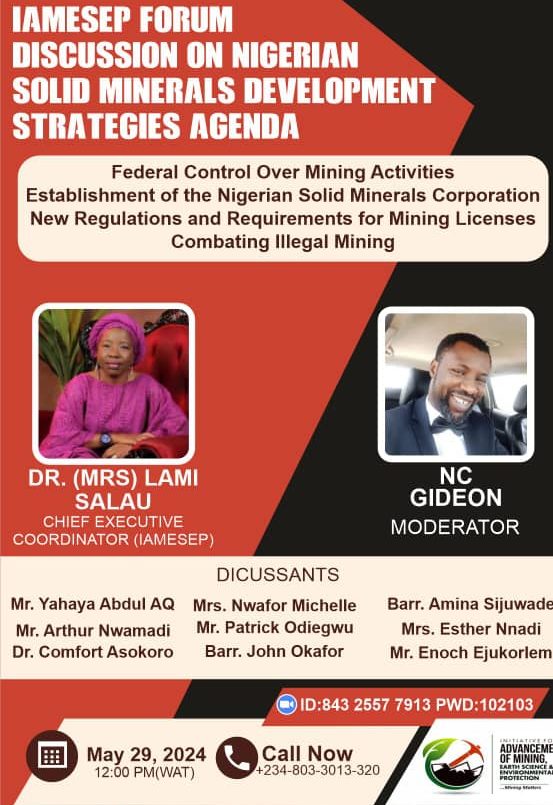
IAMESEP-IMAG: EXPERTS CALL FOR COLLABORATIVE STRATEGIES IN NIGERIAN SOLID MINERALS DEVELOPMENT
By Aishat Momoh. O.
The IAMESEP Mineral Advocacy Group (IMAG) on Wednesday, hosted a comprehensive webinar to discuss strategies for the development of Nigeria’s solid minerals sector. The key topics discussed included Federal Governtment control over mining activities, the establishment of the Nigerian Solid Minerals Corporation, new regulations for mining licenses, and combating illegal mining.
The panel included Dr. Mrs. Lami Salau, CEO of IAMESEP, who moderated the event alongside NC Gideon. Discussants included notable figures such as Mr. Yahaya Abdul AQ, Mr. Arthur Nwamadi, Dr. Comfort Asokoro-Ogaji, Mrs. Nwafor Michelle, Mr. Patrick Odiegwu, Barr. John Okafor, Barr. Amina Sijuwade, Mrs. Esther Nnadi, and Mr. Enoch Ejukorlem.
The primary objectives of the discussion were to promote collaboration among professionals, enhance partnerships with international bodies, and address the implications of federal control over mining activities.
Participants discussed the Mineral Resources and Environmental Management Committee’s (MIREMCO) role, calling for enhanced enforcement of existing regulations, emphasizing the need for clear communication and greater collaboration with federal and state authorities.
Dr. Mrs. Lami Salau opened the discussion by highlighting the need for better collaboration and networking among professionals and international bodies to advance Nigeria’s mining sector. She debated the issue of Federal control over mining activities, emphasizing that a review of the current framework is necessary to address state-level bans on mining and the Federal Government’s role in overseeing the sector.
Patrick Odiegwu highlighted the importance of Federal oversight to prevent State Governments from overstepping their judicial powers.
He emphasized the necessity for the Federal government to assert its control over the mining sector, similar to its management of the oil and gas industry. He argued that State Governments lack judicial power over the sector and urged for clear Federal regulations to prevent unauthorized state interventions.
Enoch B. Ejukorlem advocated for a unified approach to integrate illegal miners into the formal mining sector. He suggested that recognizing and regulating these miners could leverage their skills for the industry’s benefit while Amina Sijuwade stressed the importance of dialogue between the Federal and State Governments to effectively manage mining operations and enforce regulations.
Arthur Nwamadi questioned the feasibility of completely eradicating illegal mining and called for practical solutions.
Meanwhile, Comfort Asokoro-Ogaji highlighted the need for partnerships among miners to foster rapid growth and reduce corruption. She also suggested the establishment of a National Corporation Agency to streamline operations and regulatory improvements.
Ibezim Emmanuel underscored the importance of educating host communities about the benefits of mining investments to prevent illegal mining, this way the host community will be engaged.
Esther Nnadi however, pointed out that continuous planning without execution hinders progress and called for actionable steps to harness Nigeria’s mineral resources effectively.
Dr. Amuda A. Kayode emphasized the need for accurate data on mineral resources and a clear legislative framework that defines the roles of all stakeholders. He advocated for laws that ensure federal oversight while promoting state and local interests.
Abdullahi Babale recommended that the government rebrand illegal miners by formalizing their skills and integrating them into small-scale mining operations.
Mrs. Nwafor Michelle noted that the lack of finance hinders many miners from operating legally and called for financial support mechanisms to aid legal mining operations.
In her closing remarks, Dr. Mrs. Salau proposed drafting a position paper to consolidate the insights from the discussion. She emphasized that state control over mineral resources would lead to increased insecurity and highlighted the need for collaboration to ensure cost-effectiveness and relieve burdens on individual miners.
The webinar underscored the critical need for a concerted effort to establish a clear legislative framework that balances federal and state interests, promoting sustainable development in Nigeria’s mining sector. The panelists agreed that through synergy and effective management, the country’s rich mineral resources could significantly contribute to national development and economic diversification.
The IMAG webinar concluded with a call for ongoing dialogue and follow-up on the contributions made to monitor progress in the industry.
